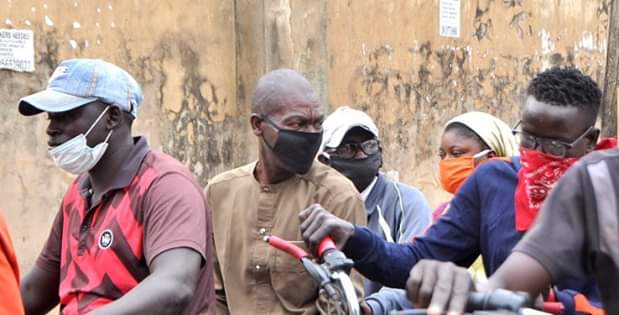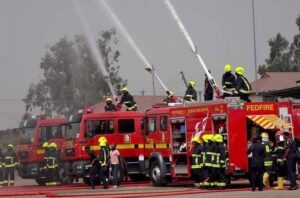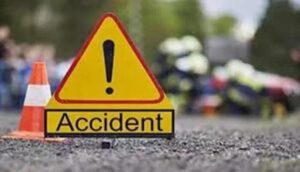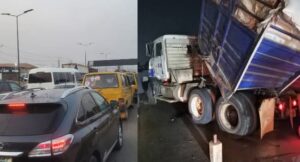
Many Nigerians on Monday ignored social distancing guidelines as the lockdown to curtail the spread of coronavirus was lifted in Lagos and Ogun states and the Federal Capital Territory (FCT).
President Muhammadu Buhari, in a broadcast to announce the gradual easing of the lockdown, said: “We will strictly ensure the mandatory use of face masks or coverings in public in addition to maintaining physical distancing and personal hygiene.”
FCT residents trooped out in numbers as the lockdown ended.
Most of them wore facemasks but did not observe social distancing requirements.
Many commercial and private vehicles defied the government’s directive on the number of people to carry.
Residents besieged banks, with some expressing displeasure with their safety protocols.
In Lagos, traffic snarl, stranded commuters at major roads and bus stops were a common sight.
Motorists along the Oshodi Apapa expressway were held in traffic for several hours, especially between Iyana-Isolo and Toyota bus stops where construction work was ongoing.
There was also a gridlock on the Third Mainland Bridge.
Despite the early morning rains, residents trooped out at various bus stops scrambling for seats and tickets in disregard of distancing guidelines.
While some of them wore facemasks, many others had none on as they clung onto each other.
The crowd at Bus Rapid Transport (BRT) stations was as a result of the reduction in the number of passengers on a bus.
Commercial buses also seized the opportunity to triple their fares, forcing a lot of people who could not afford the new prices to trek.
The National Union of Road Transport Workers (NURTW) Lagos State Council Chairman Alhaja Musiliu Akinsanya (aka MC Oluomo) had directed drivers not to allow passengers without face mask to board their vehicles.
Our reporter observed that many Danfo (yellow bus) drivers did not comply with the 60 per cent passenger-per-bus directive.
From Mile 2 to Oshodi and Airport Road, many of the 14-seater buses were filled to capacity. It was the same in Mushin, Ojuelegba, Yaba, Oyingbo, Lagos Island, Oshodi, Agege and Iyana Iba.
However, the majority of the passengers, drivers and conductors wore facemasks.
At Ilasamaja, NURTW officials ensured that drivers without face masks were not allowed to work.
A passenger, Kemi Adeolu lamented the 100 per cent increment in transport fare.
Akinsanya urged NURTW unit and branch chairmen to address the issues.
“I urged them to adhere strictly to the government’s directives and resolve whatever crisis that may arise from the implementation.
“We have released some phone numbers – 08033068121, 08033038205, 08094082693 – to the public to report errant drivers and conductors,” he said.
In various parts of Lagos, sellers of non-essential commodities opened their shops but complained of low patronage.
Most of them lamented that they had exhausted their savings.
The case was however different for commercial banks as residents flooded banking halls and Automated Teller Machines (ATMs).
It was gathered that a customer at one of the commercial bank branches at Onipanu collapsed while trying to use the ATM.
The customer, a male, was said to have gasped for breath when he fell; others on the queue to took their heels. He was said to have had had a high temperature.
It was a rowdy session at Guarantee Trust Bank (GTB) Ogba as tens of customers threw caution to the wind.
Although most of them wore facemasks as shown in a viral video, the customers had obvious body contacts as they forced their ways into the banking hall.
At most ATMs and bank branches visited, crowds gathered outside and in canopies waiting for their turn to enter the hall; long queues were a regular sight at ATMs.
Eateries and banks along Isaac John Street, Ikeja, had low patronage with no sights of the usual gridlock experienced on that road.
An activist Dr Josephine Okei-Odumakin, warned Nigerians not to see the relaxation of lockdown as an excuse for irresponsible behaviour.
She warned federal and state governments to avoid abdicating their responsibilities including the provision of effective leadership in these trying periods.
Okei-Odumakin said: “We advise our people to take the utmost precautions to scrupulously and diligently observe all Covid-19 protocols, especially the proper wearing of face masks, observation of physical distancing and other hygiene rules and regulations of regular washing of hands with soap as well as use of hand sanitisers.
“To the Federal and State governments, relaxation of lockdown must not become abdication of the responsibility to continue to give effective leadership in these trying periods,” she said.
Residents of Imo wore different facemask designs after the state made it mandatory. Many have seen it as an opportunity for brisk business.
Some of the facemasks are sold for between N100 and N300 depending on the quality of material used to sew it.
In Warri, Delta State, transport service providers charged outrageous fares. “Life in Nigeria is hard,” a trader lamented.
Maintaining social distancing was difficult, but most residents wore facemasks, mostly made of cloth materials.
Customers in Awka, Anambra State capital, had a hectic time in their bid to get into the various banking halls.
There were long queues and clusters of customers within the bank premises waiting to enter the banking halls.
In Umuahia, the Abia State capital, banks and government offices reopened.
There were also long queues in some of the banks visited, while security personnel had a hectic time controlling the customers who besieged the ATMs.
Traders in Aba were prevented from opening their shops in compliance with the government’s orders.
They were sent away by policemen, while some of them were arrested for opening shops against the government’s directives.












